October Observations 10
October 10, 2024

Text from each image below
1. CONTEXTUALIZING MENTAL HEALTH CARE "Each generation must...discover its mission, fulfill it or betray it..." Frantz Fanon
2. On this WORLD MENTAL HEALTH DAY, let us remember the insights of the progressive psychiatrist Frantz Fanon, who outlined essential principles for effective mental health care. here are a few takeaways for professionals in the field.
3. MENTAL HEALTH IS POLITICAL : Fanon asserted that an individual's mental state is influenced by their political environment. In "The Wretched of the Earth", he explored the psychological effects of colonial oppression - how marginalized individuals internalize trauma and societal rejection. He regarded institutional mental health care as disciplinary power against those oppressed by colonial systems.
Mental health professionals need to adopt a political lens to more more effectively support those facing systemic oppression and advocate for more equitable care.
4. CARE WITHIN COMMUNITY AND SOCIAL CONNECTIONS : Fanon rejected authoritarianism in institutional mental health care, advocating instead for community models that foster social relationships. He implemented group therapies, patient unions(known as "the Club") , ergotherapy workshops (including printing, woodwork, and pottery), libraries and cultural events that rebuild social ties.
5. CULTURAL COMPETENCE FOR INCLUSIVE CARE : Fanon noted North African Muslim men were often dismissed by doctors, with their psychological issues labeled as "imaginary" when no physical ailments were found, highlighting a deep rooted bias in Western psychiatry. He traveled through Algeria, observing that local culture prioritized religious and familial gatherings , favoring storytelling and poetry. Learning from this, Fanon and his team adapted their care activities.
6. LANGUAGE AS LIBERATION : The barriers Fanon faced in his interactions with non- French speaking North African patients highlighted the crucial role of language in cultural empowerment and psychological health. He believed that language is not only essential for meaningful communication but also shapes our mental framework.
Mental Health professionals need to make efforts to connect serve users with team members who speak their native language, as this helps build trust and allows for more meaningful interactions. By valuing linguistic diversity, we challenge the notion of a singular perspective on mental health.
7. RESISTANCE AGAINST OPPRESSION : He advocated for revolutionary action as a means of "disintoxicating" the oppressed, critiquing pacifism that often perpetuates the status quo. His call for empowerment through resistance highlights the importance of fighting for social justice and systemic oppression.
Mental health professionals need to acknowledge the impact of systemic oppression on well-being. Recognizing the role of resistance, including the reality of violence faced by marginalized communities empowers individuals to reclaim their narratives.
Frantz Fanon was a progressive psychiatrist from Martinique who critiqued racism and colonisation in western mental health practice. His key works include "BlackSkin, White Masks" (1952) , 'A Dying Colonialism" (1959) , and "The Wretched of the Earth" ( 1961) , with 'Toward the African Revolution' published posthumously in 1964. His focus on how societal conditions shape mental distress resonates deeply with our work, reminding deeply with our work, reminding us that mental health is inherently a social justice issue.
8. WHAT ELSE DID FANON SAY
"Black Skin, White Masks" ( 1952) :Fanon explores the dual identify of the colonized , torn between native values, and colonial culture, that breeds feelings of inferiority and self hatred, fueled by colonial education and media.
"The Wretched of the Earth" (1961) - Fanon emphasized the interconnections of political , social , and cultural resistance in the Algerian revolution. he advocates for a cultural revival as essential for reclaiming identify and fostering solidarity among the oppressed.
"Toward the African Revolution" ( 1964) -Fanon asserts that intellectuals must engage with the realities of colonial and post - colonial life, using their knowledge to advocate for social justice.
